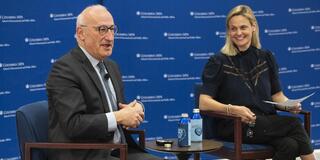U.S. Industrial Tech Policy Not a Hindrance to Transatlantic Ties

Europe and the United States can forge a more coordinated strategy around technology and industry to strengthen, not weaken, transatlantic ties, said the longtime diplomat Philippe Etienne, who served as France’s ambassador to the United States from mid-2019 until February 2023, in an address at SIPA on April 19.
An expert in the European Union and continental Europe, Etienne had previously been a diplomatic adviser to President Emmanuel Macron from 2017 to 2019 and over the years held numerous other posts within France’s Ministry for Europe and Foreign Affairs.
As SIPA’s McGovern Visiting Professor for spring 2023, Etienne was charged with giving the School’s annual George McGovern Lecture. In his opening remarks, he explained the importance of transatlantic cooperation in forging greater efficiency and security.
“It is impossible even for the U.S. to have everything strategically produced at home,” Etienne said.
By relying on one supply chain, he said, countries face higher economic risks during times of crisis. In the hope of strengthening its economic resilience and increasing its defense capabilities, Europe has become more independent in its supply chain and is finding new ways to prepare sectors that would be more sensitive to future crises.
[The United States and European Union] have very important commonalities in our policies.... Even where we see differences emerge, we see how American initiatives have given the EU a strong impetus to build up its own industrial policy instruments.”
— Philippe Etienne
“We could prepare ourselves to better coordinate for the next crisis… through a commitment to refrain from export restrictions and bans in our bilateral trade to improve their resilience or undertaking stress testing our supply chain policies to improve their resilience,” Etienne said.
Etienne explains that the United States and European Union share common stakes in the future of their democracies, especially when it comes to personal data of their citizens and how it is used. These shared stakes create common objectives, including defending their independence, protecting industrial jobs, taking the lead in the technology sector to determine competitiveness, and making transitions on the climate and energy front more seamless.
“We have very important commonalities in our policies, in particular regulatory efforts to accelerate the electrification of vehicles,” Etienne said. “We can coordinate on promising technological developments such as nuclear fusion or small modular reactors. Even where we see differences emerge, we see how American initiatives have given the EU a strong impetus to build up its own industrial policy instruments.”
Etienne was joined by Sara Schaefer Muñoz MIA ’02 — the Wall Street Journal’s deputy world coverage chief — afterward for a fireside-style chat. They discussed the impact of investment policies on the Global South, the Russian invasion of Ukraine, the rapid rise of artificial intelligence, and the growing impact of climate change.
“Each country is in a very different position and we need to have a very ambitious policy to support the most vulnerable countries,” Etienne said. “I think the United States and the European Union have a lot to do.”
Watch the complete program: